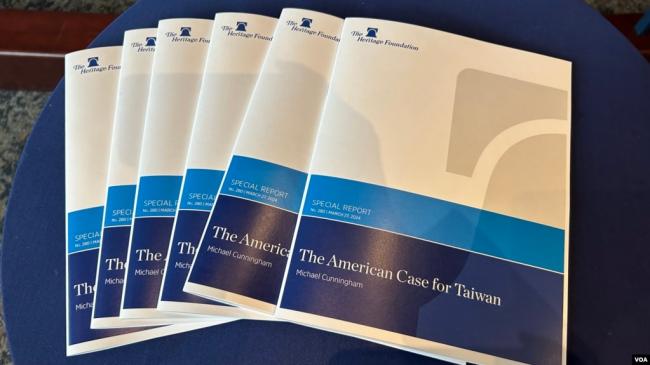News on U.S., Taiwan
US think tank report: The US government must clearly explain to its own people the reasons for defending Taiwan
Editor : Fang Xun / Source: VOA / https://www.aboluowang.com/2024/0330/2037049.html / Image : The Heritage Foundation, an American think tank, released a report on "Why the United States Supports Taiwan." (Photographed by VOA Zhong Chenfang on 28 March 2024)

A new report released by a U.S. think tank said that the importance of Taiwan to the United States is not clear to ordinary Americans. Policymakers in Washington should explain to the American people why Taiwan is very important to ordinary Americans and why it prevents the United States’ primary geopolitical rivals and national security Threat - People's Republic of China - Gaining control of Taiwan is an important national interest of the United States.
The Heritage Foundation, a conservative think tank in Washington, released a report titled "The American Case for Taiwan" on Wednesday (27 March 2024), explaining why maintaining Taiwan from being attacked or taken over by China is a national security issue for the United States. Interests and economic prosperity are crucial especially on how to work with Taiwan to help maintain Taiwan's security in a changing region and cross-strait dynamics.
“If policymakers in Washington can’t explain to a farmer in Kansas, a teacher in Indiana, or a welder in Maine how what’s happening in Taiwan will affect their lives, they’re going to have a hard time explaining it. justification for sending America’s treasure, not to mention soldiers, halfway around the world to defend this self-governing island if needed,” the report said.
Taiwan’s geopolitical importance
The report written by Michael Cunningham, a researcher at the Heritage Foundation's Asia Research Center, mentioned that Taiwan is not only a threatened democracy, but its most direct and fundamental importance to U.S. national security "can be summed up in one word: "Geography", Taiwan is an important international maritime transportation route. The first island chain connected with Japan and the Philippines strangles China's throat in and out of the Western Pacific. Therefore, Taiwan is called "the first important node in the island chain" by military strategists.
"Once China gains control of Taiwan, it will be able to breach the first island chain, positioning it at sea to deny the United States, Japan and other allies, and use Taiwan as a springboard to expand military power deep into the Pacific," "The report said.
Kong Mingshang pointed out at the Heritage Foundation's report conference on Thursday (28 March 2024) that Taiwan is located at an "important node" in the first island chain. China is equivalent to being restricted within its own borders. Although the People's Liberation Army does have activities outside the borders, it still does not have that freedom of action. Now the United States has reached a consensus that "the Chinese Communist Party is the biggest external threat to the United States." Does the United States now want to give China the strategic advantage across the first island chain?

Image : Kong Mingshang, a researcher at the Asian Research Center at the Heritage Foundation, an American think tank. (Photographed by VOA Zhong Chenfang on March 28, 2024)
"China has always been clear that it wants to dominate Asia, that it wants regional hegemony. And the definition of regional dominance is that it has to drive the U.S. military out of Asia in order to achieve that goal. If it gets Taiwan, it will aggressively pursue that goal. So if it wants to have regional dominance, Taiwan is very important to it," he said.
Important nodes in the first island chain and reassurance to Beijing
Regarding Kong Mingshang's statement that Taiwan is "located at an 'important node' in the first island chain," some experts do not agree with the United States' use of this to describe Taiwan's strategic importance to the United States. They believe that in order to prevent war in the Taiwan Strait, the United States It is also necessary to provide Beijing with symbolic reassurances of diplomatic recognition, including not supporting Taiwan independence and not signing a mutual defense treaty with Taiwan. If Taiwan is positioned as an "important node in the first island chain," the United States seems to be implying that it supports both sides of the Taiwan Strait. A position of permanent separation and no support for unity.
Voice of America (VOA) asked Kong Mingshang to comment on these different views.
He said that he actually struggled with this point when writing the report.
"In fact, I hope Beijing can see that we are not calling for a change in the status quo at all. I hope our friends in Beijing who are listening to these discussions will realize that what we are advocating is to continue to maintain the status quo, and that is in their current interests. It is also in our and Taiwan’s interests,” Kong Mingshang said.
However, he said that Taiwan's geopolitical importance does make it difficult for both the United States and China to be happy in the long run. China's acquisition of Taiwan is a major risk for the United States, but China also has its own interests and wants to gain control of Taiwan. .
“That’s why this is such a complex and difficult issue, and it could be a Cold War-like issue, just as we had a very uncomfortable situation with the Soviet Union for decades, we also have to live with a situation that has been uncomfortable for decades, especially when it comes to Taiwan," Kong said.
Taiwan's role in the global economy
In addition to Taiwan's geopolitical importance, Taiwan's important role in the global economy is another reason why Taiwan is important to the United States, Kong said.
He said that Taiwan is not only a major semiconductor production center, providing more than 90% of the world's advanced semiconductors, but also has the world's leading manufacturing capabilities under the "contract manufacturing" model. Taiwan has many "hidden champions" that produce "complex but complex products". "Monotonous" components, such as screws, but if a war breaks out across the Taiwan Strait, many factories, including those in China, may face production stagnation.
Due to the importance of Taiwan to U.S. national security, Kong Mingshang believes that U.S. policymakers must know how to protect national interests.
Maintaining the status quo is the goal
He said in the report that the United States urgently needs to take action to strengthen the United States' deterrent posture in the Western Pacific, arm Taiwan so that it can defend itself, and do so in a manner consistent with Washington's long-term Taiwan policy, including the Taiwan Relations Act, the "Six Assurances" and Under the guidance of the three joint communiques between the United States and China, we will expand economic, diplomatic and military cooperation with Taiwan.
At the same time, he also believes that some hotly discussed proposals, including diplomatic recognition of Taiwan or signing a defense treaty with Taiwan, are not supported by the Taiwan government and may even trigger a military response from Beijing. These are what policymakers hope avoid such a crisis, this report recommends not taking such extreme measures but taking bold and thoughtful actions to preserve peace, stability and deterrence.
"It is particularly important that U.S. policy continue to emphasize the maintenance of the status quo, that is, Taiwan continues to enjoy de facto sovereignty and freedom from rule by the People's Republic of China, and neither side can force a final settlement of Taiwan's diplomatic status - this position Received overwhelming support from the people and government of Taiwan," Kong Mingshang said in the report.



No comments:
Post a Comment